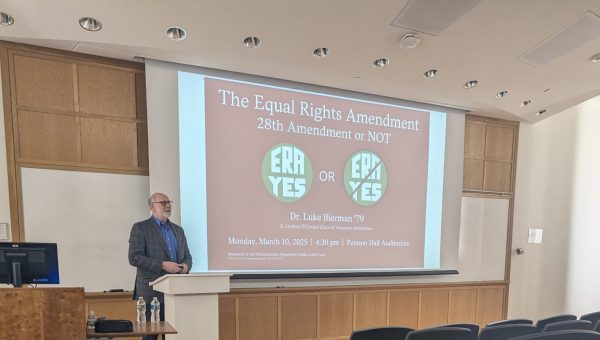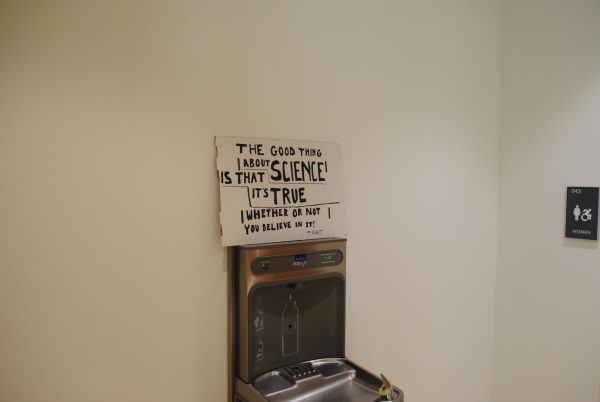Petty Political Correctness
Arguing over the wording of the Pledge of Allegiance was bad enough, but dismembering the framework of the American school to achieve political correctness is ludicrous and extreme. That’s right, I’m referring to the use of “first-year” over “freshmen” in reference to the inaugural two-semester period we must all conquer before moving on to sophomore status and beyond.
Little known to us all, the Pledge of Allegiance was part of an advertising campaign for a popular kid’s magazine in 1892. The authors of the Pledge intended it to be an inspiring call for national unity in a time that saw society torn in half over the discordant Civil War. As the nation moved to adopt the motto as its creed, President Dwight Eisenhower signed a bill on June 14, 1954 inserting the words “under God” with the rationale that, “despite our great physical strength we must remain humble. [The words] will help us to keep constantly in our minds and hearts the spiritual and moral principles which alone give dignity to man, and upon which our way of life is founded.” Those of you who, by some anomaly, find it necessary to pick apart his statement, yes, Eisenhower showed preference to a specific deity by saying that God will keep us modest. For those of you who find insult in this petty violation of church and state, I’ll have you know that I believe that bringing the Pledge to court means you are trying to bring down one of the most inspiring doctrines of all time in your delusional obsession with making right the symbols of our society that pose an insignificant threat to our country’s outstanding principles of equality, freedom and justice for all.
I can’t help but wonder what the addition of two words could possibly do for the allegiance of a country to a common cause. Will recitation of the phrase “under God” somehow cause us to feel a sense of submission to American nationalism, as if He demands it? Hardly. Words don’t mean anything nowadays. We drop f-bombs and say, “I love you” to everyone we barely know without meaning any of it. It’s phenomenal how freely our speech flows, what little filtering it passes through to come out of our mouths, and how it has become a common consensus that the sincerity and solemnity of vocabulary has diminished to an almost casual meaning. People who raise hell (wait, is it politically correct to say that word) over a phrase that was meant to inspire unity, not impose religion on the masses, is ridiculous. I assure you that in all the background research I conducted, not one source popped up naming the Pledge as a conspiracy created by the Church to brainwash nonbelievers into Christianity.
Our country was founded, the Pledge of Allegiance written, in a time much different than the present. Everyone was church-going, God-fearing and law-abiding. Criticizing and seeking alterations to documents that are simply showing homage to our Founding Fathers and the religion-derived discipline that gave birth to our country, is to wish to change the history and the roots of our great nation. A bunch of Caucasian, Christian men in powdered wigs wrote the Constitution over 200 years ago, but that didn’t stop our country from becoming a haven for people of multi-racial, multi-religious, hair or hairless backgrounds. Taking their work out of historical context is judging second-handedly and after-the-fact literary analysis we have no right to partake in.
On a similar track, I had never heard of the term “first-year” before I came to Colgate, and I think that it is absurd that we have to convert. At the Maroon-News pre-orientation, we were told that we had to refer to college newbies as “first-years” — as if the term “freshmen” was insufficient and not specific enough to describe kids in their first year of college. Of course, it’s not even about the meaning or appropriation of a word anymore. Its about petty political correctness, soothing feminists and extremists who assay supposed sexist words with an OCD, nit-picky attitude and a desperation that makes me think they just want to find their five minutes of fame and go down in history as the individuals who abolished use of the word “freshMEN”. Rather than ignore the unfortunate ending of a word — that everyone knows is not referring singularly to men — some genius decided it would be easier to erase the word from the dictionary and replace it with a hyphenated phrase.
While the First Amendment clearly promotes “freedom of religion” in backing anti-“under God”-ers, there is also a sense of choice in reciting the Pledge. If you disagree, just don’t say the words, don’t ruin it for the rest of us who appreciate the innocent foundation from which the composition, and our country, was born. At the same time, barring us from using words that can wrongly be perceived as sexist is a violation of our right to free speech. I don’t want to worry about every single idiom I use just because some silly people who are obviously bored, dedicated their lives to seeking-out and destroying socially slanted words. Don’t get me wrong — I’m all for gender equality, but this is one example where the public is being taken to the cleaners in bleaching out words whose insulting quality is far-fetched.
We live in the twenty-first century — a time chock-full of useless fighting. Since when did some words mean so little, while the legitimacy of others hang by their precarious ending? It seems as though we are getting it all wrong. Instead of fighting against our language, we should fight against obstacles that truly threaten the well being of our country. No one is going to die over a word that seems to suggest a masculine preference, and many of my friends-who-are-girls have expressed their indifference to the word choice. I think its time we stopped looking for Wikipedia.com glory in the elimination of words, whose various infractions need to be scoured for, to be found. Instead, we ought to target real dilemmas that involve real threats to national security. No one has been hurt in all the times I’ve mistakenly used “freshmen”, and, in the end, it just becomes a misunderstood eight-letter word.





